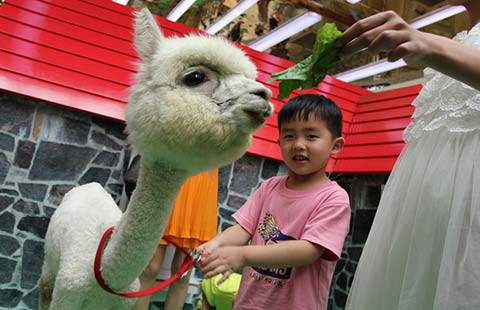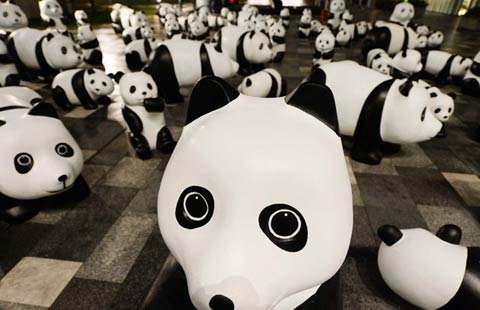Some lab animals get reprieve from testing
Updated: 2014-06-05 07:23
By Xu Wei (China Daily)
|
||||||||
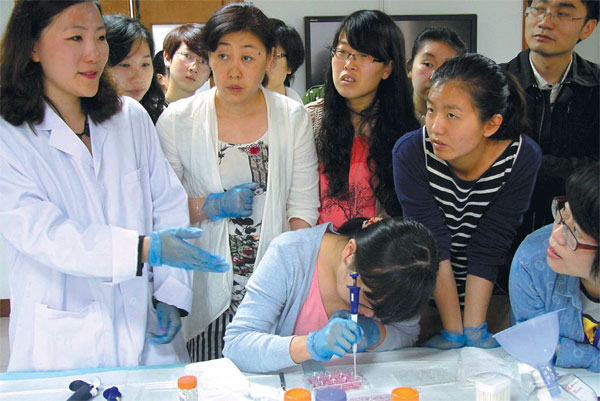 |
|
Chinese researchers at a training session into alternative procedures for eye irritation tests that do not require the use of live animals. It's a workshop recently held in Guangzhou. Cheng Shujun / For China Daily |
Lifting of requirements in cosmetics sector is a welcome move, but there is still much more to do, Xu Wei reports.
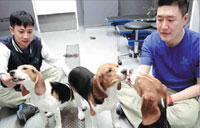 |
| Tightening leash on testing on animals |
| Get beautiful without harming animals |
Although the move has won applause from animal rights groups and industry insiders, some laboratories are expected to struggle to adapt.
A regulation released in December by the China Food and Drug Administration stated that, from June 30, domestically manufactured "non-specialized cosmetics" - including shampoo, soap, nail products and some skincare products - can be sold even if they haven't been tested on animals.
The change follows blanket bans on animal-based testing in a number of countries and regions, including the European Union, India and Israel. But insiders say the success of the move is contingent on a number of factors, such as cost and the availability of the appropriate technology and scientific expertise.
Animal rights groups have hailed the move as a major step forward in the push for humane testing in Chinese laboratories. The lifting of the requirement is also expected to boost exports to the European Union, the world's largest cosmetics market, which banned the sale of products developed via animal testing in March 2013.
"It will be a very good thing for domestic manufacturers in China, because it will enable them to sell their products in the EU, as long as no new testing has been done for their products since March 11, 2013," said Troy Seidle, director of the Research and Toxicological Department with the United States-based Humane Society International.
However, experts said China still has a long way to go before it can match international standards in the use of in vitro methods - tests conducted on cells grown in petri dishes or test tubes - and other alternative methods.
"It is not simply a shift in testing methods from animals to in vitro methods. There is still much more work to be done at the infrastructure level and in technological standards," said Cheng Shujun, director of the Toxicology Department with the Technology Center at the Guangdong Entry-Exit Inspection and Quarantine Bureau.
Cheng said a total ban on animal testing would be premature, in part because in vitro testing procedures are very demanding in terms of ground research. "We are not totally opposed to certain testing methods. We can only try our best to catch up," he said.
Zhang Quanshun, a senior scientist and program manager with the Institute for In Vitro Sciences in the United States, said it could take a long time for Chinese laboratories to change the way they conduct research. "Undoubtedly, the country's cosmetics industry has undergone robust growth, yet in terms of testing methods and technology, it still lags far behind," he said.
According to Zhang, only two Chinese cosmetics companies have the ability to produce 3D cultures - artificially created environments that allow cells to grow and interact with the environment in all three dimensions - for testing, while in the US there is a whole industry chain. "After all, the priority is to guarantee the safety of consumers," he said.
A late start
Compared with European countries and the United States, China had a late start in the development of in vitro methods, and the country's scientists only started researching the procedures about a decade ago, according to Cheng, who said very few scientists conducted research into alternative testing in the early part of the century.
"In recent years, these methods have attracted the attention of a growing number of researchers and labs in China, and research is slowly picking up. But compared with Western countries, there is still a huge gap," he said.
The relaxation of the test requirements for some cosmetic products has raised concerns among Chinese consumers. A number of netizens on guokr, a social networking site for science enthusiasts, wondered if the phasing out of in vivo testing would compromise product safety. "This is ridiculous. We can't test the products on animals, but should we test them on human beings instead?" wrote a netizen under the username Xenopolites.
Those concerns were dismissed by some European scientists, who said the change won't automatically mean that products will become less safe.
"In the UK, we ceased testing cosmetics on animals in 1998, and have experienced no problems as a consequence. We welcome the suggestion that China may wish to move in this direction and are happy to share our experience with colleagues there," said Judy MacArthur Clark, head of the Animals in Science Regulation Unit at the United Kingdom's Home Office.
She warned that the new testing methods would require a large amount of investment, which could present challenges for some testing centers and cosmetics manufacturers: "There will be some initial set-up costs for Chinese cosmetic companies while they retrain their staff to conduct in vitro tests. However the use of validated alternative tests will be both cheaper and faster than using animals, so the companies will benefit greatly from this saving in due course."
Meanwhile, compared with animal testing procedures, some in vitro methods have advantages in terms of reduced testing times and the use of artificially grown cells that have a closer similarity to human skin tissue than animal cells.
"Indeed, many of the in vitro test methods are more specific than the traditional tests on animals and are widely considered to be more reliable," MacArthur Clark said, adding that the authorities' concerns about consumer safety may dictate the pace at which measures to phase out animal testing are introduced.
"Consumer safety is paramount, and it's important to respect the concerns of Chinese consumers and provide reassurance. This may dictate the pace at which changes will be implemented," she said.

 Teaching Chinese children self-esteem through dance
Teaching Chinese children self-esteem through dance
 New Bay Bridge woes called 'maintenance'
New Bay Bridge woes called 'maintenance'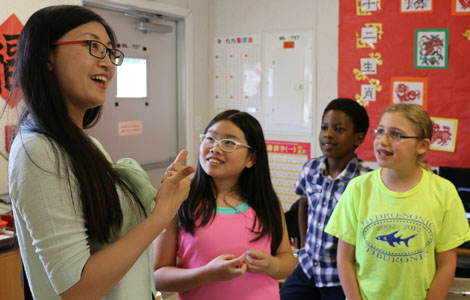
 Students find Shanghai 'cooler' than New York City
Students find Shanghai 'cooler' than New York City
 China or US: Which offers a better life?
China or US: Which offers a better life?
 Splash of joy
Splash of joy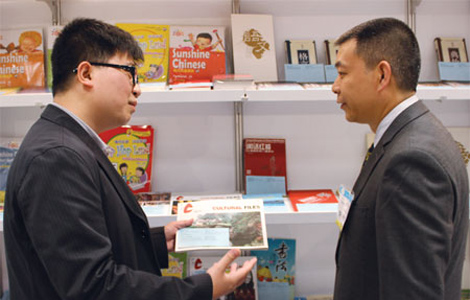
 Chinese, US publishers suffer from tech changes
Chinese, US publishers suffer from tech changes
 Taliban prisoner swap stirs debate in US
Taliban prisoner swap stirs debate in US
 Alabama County looks to GD Copper for more jobs
Alabama County looks to GD Copper for more jobs
Most Viewed
Editor's Picks

|

|

|

|

|

|
Today's Top News
Foreign tech firms pose threat on Internet
China says 'punitive' PV duties fray Sino-US ties
Audit firms, SEC talk settlement terms
US puts new duties on Chinese PVs
US to boost military in Europe
US missile defense against DPRK?
Director of JFK to make movie on Snowden
Male-named hurricanes strike more fear
US Weekly

|

|



